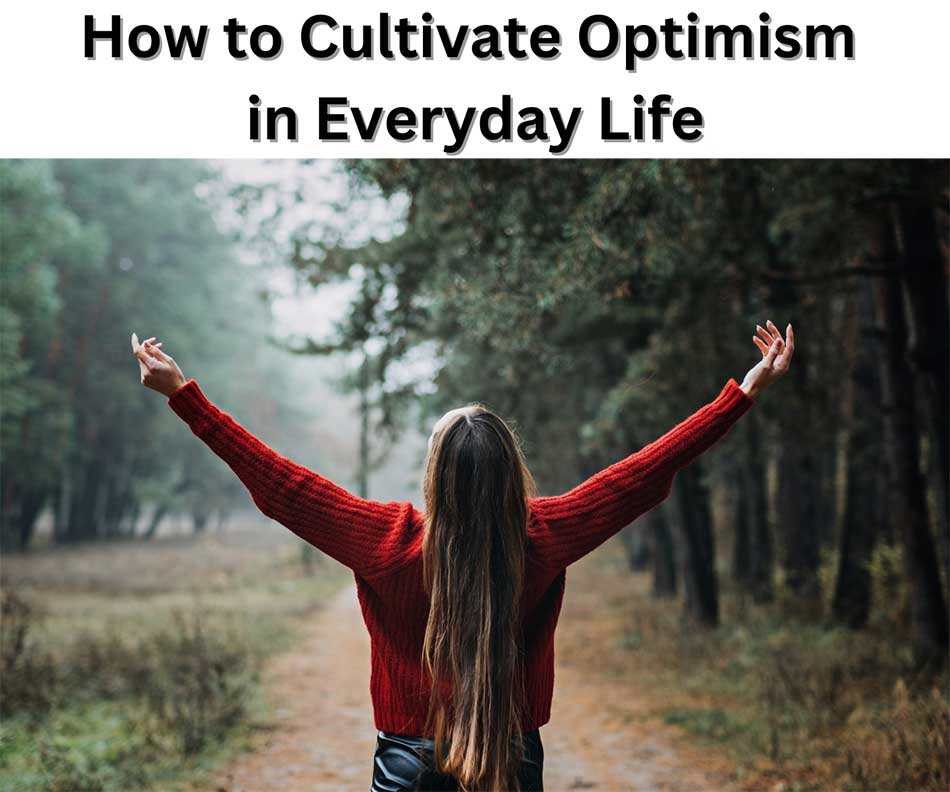
How to Cultivate Optimism in Everyday Life: Training Your Brain for Positivity and Resilience
In a world often saturated with negativity, from news headlines to personal challenges, maintaining a positive outlook can feel like an uphill battle. It’s easy to succumb to cynicism, worry, and a pessimistic view of the future. Yet, optimism is far more than just “positive thinking”; it’s a powerful mindset that significantly impacts our mental health, resilience, motivation, and overall quality of life. It’s the belief that good things will happen, that challenges can be overcome, and that effort leads to positive outcomes.

While some individuals appear naturally optimistic, this crucial trait is not simply inherited; it’s a skill, a habit of mind that can be consciously cultivated and strengthened over time. It involves training your brain to seek opportunities amidst adversity, learn from setbacks, and approach life with a hopeful and proactive stance. Embracing optimism is a deliberate choice that, when consistently practiced, can fundamentally transform your perception of reality and your ability to navigate life’s inevitable ups and downs with grace. This is fundamental to understanding why happiness is a choice, not a destination.
This article will delve into the profound importance of cultivating optimism in everyday life, explore the science behind its benefits, and provide actionable strategies to help you train your brain for positivity, enhance your resilience, and unlock a more joyful and fulfilling existence.
The Optimism Advantage: Why a Positive Outlook Matters
Optimism isn’t naive; it’s pragmatic. Its benefits extend far beyond just feeling good:
- Increased Resilience: Optimistic individuals bounce back faster from setbacks, viewing them as temporary and surmountable.
- Better Health Outcomes: Studies link optimism to stronger immune systems, lower risk of heart disease, and greater longevity.
- Enhanced Problem-Solving: Optimism fosters a proactive approach to challenges, encouraging creative solutions rather than passive resignation.
- Greater Motivation: Believing in positive outcomes fuels persistence and effort towards goals.
- Improved Relationships: Optimistic people tend to have more positive social interactions and stronger connections.
- Reduced Stress & Anxiety: A hopeful outlook lessens worry and rumination about negative possibilities. This directly impacts the psychology of happiness: how your brain responds to joy.
Cultivating optimism is a powerful investment in your overall well-being.
Strategies to Cultivate Optimism in Everyday Life
Optimism is a habit of mind built through consistent, intentional practices. Here’s how to integrate it:
1. Practice Gratitude Regularly
Gratitude is a direct pathway to optimism, training your brain to focus on the good.
- The Strategy: Dedicate a few minutes daily to listing things you are genuinely thankful for. Be specific (e.g., “grateful for the unexpected call from an old friend” instead of just “grateful for friends”).
- Why it Works: It counteracts the brain’s negativity bias, actively rewiring it to seek out and register positive experiences, even small ones.
- Real-Life Example: Sarah used to wake up and immediately dread her workday. She started a morning ritual of listing three specific things she was grateful for (e.g., “warm coffee,” “my comfortable chair,” “a sunny window”). This small shift consistently set a more positive tone for her day, making her approach challenges with more optimism.
2. Challenge Negative Self-Talk
Optimism thrives when the inner critic is muted.
- The Strategy: When you catch yourself thinking negative thoughts (“I can’t do this,” “This will fail”), pause and challenge them. Ask: “Is this 100% true? What’s the evidence against it? What’s a more realistic or empowering way to see this?”
- Why it Works: It dismantles pessimistic thought patterns and replaces them with more balanced, hopeful perspectives.
- Real-Life Example: Mark often told himself, “This new project is too complex; I’ll never get it right.” He learned to challenge it: “I’ve handled complex projects before. I can break this down. It will be challenging, but I am capable of learning.” This allowed him to approach daunting tasks with confidence, even when considering home-based business opportunities.
3. Limit Exposure to Negative Inputs
Just as you watch what you eat, be mindful of what you feed your mind.
- The Strategy: Be selective about news consumption, social media feeds, and even the people you spend the most time with. Reduce exposure to chronic complainers or sensationalist media.
- Why it Works: Constant exposure to negativity can shift your mindset towards pessimism. Protecting your mental environment is crucial for cultivating optimism.
- Real-Life Example: Emily found her morning news ritual left her feeling anxious and pessimistic. She switched to reading positive news stories or listening to uplifting podcasts, intentionally starting her day with more positive information.
4. Surround Yourself with Positive Influences
Optimism is contagious.
- The Strategy: Seek out friends, colleagues, and communities that are supportive, forward-thinking, and resilient. Engage with content (books, podcasts, speakers) that inspires and educates.
- Why it Works: Positive influences can provide encouragement, offer new perspectives, and model optimistic behaviors, making it easier for you to adopt them. This is also key in raising confident children, where a parent’s optimism can be deeply influential.
- Real-Life Example: David purposefully sought out a mastermind group of like-minded entrepreneurs. Their collective positive outlook and problem-solving focus helped him maintain optimism even during challenging phases of his business.
5. Practice Self-Compassion and Embrace Setbacks as Learning
Optimism isn’t about ignoring problems; it’s about viewing them through a growth lens.
- The Strategy: When things go wrong, treat yourself with kindness and understanding, just as you would a friend. Then, ask: “What can I learn from this? How can I grow?” This ties directly into the power of adapting to new situations with a growth mindset.
- Why it Works: Self-compassion builds resilience, preventing negative events from spiraling into self-blame and sustained pessimism. A growth mindset views challenges as opportunities for improvement.
- Real-Life Example: Liam lost a major client, a significant setback. Instead of dwelling on self-blame, he acknowledged his disappointment, then immediately focused on reviewing his processes to learn from the experience. He saw it as a painful lesson that would ultimately make his business stronger.
6. Engage in Acts of Altruism and Contribution
Giving back can profoundly boost your sense of well-being and optimism.
- The Strategy: Volunteer your time, offer help to a friend, or contribute to a cause you care about.
- Why it Works: Focusing on others shifts your perspective outward, reducing self-preoccupation and fostering a sense of purpose and connection. This contributes to a deeper understanding of the role of altruism in leading a fulfilled life.
- Real-Life Example: Brenda, feeling down about her own struggles, decided to volunteer at a local animal shelter. The act of caring for the animals and seeing their joy immediately lifted her spirits and gave her a renewed sense of purpose and optimism.
The Daily Choice: Sustaining Your Optimism
Cultivating optimism is a daily practice, not a one-time achievement. There will be days when it feels harder, when challenges loom large. But by consistently applying these strategies, you build a mental muscle that automatically seeks the positive, learns from adversity, and approaches life with a hopeful and resilient spirit. It’s a powerful, intentional choice that colors every aspect of your experience.
20 Empowering Quotes on Optimism and Positivity:
- “Optimism is the faith that leads to achievement. Nothing can be done without hope and confidence.” – Helen Keller
- “The only way to do great work is to love what you do.” – Steve Jobs (Optimism fuels this love).
- “The greatest discovery of all time is that a person can change his future by merely changing his attitude.” – Oprah Winfrey
- “Happiness is a choice. You choose to be happy.” – Unknown
- “What consumes your mind controls your life.” – Unknown (Choose optimism).
- “Change your thoughts and you change your world.” – Norman Vincent Peale
- “Don’t cry because it’s over, smile because it happened.” – Dr. Seuss (Optimistic reframe).
- “It always seems impossible until it’s done.” – Nelson Mandela (Fueled by optimism).
- “The sun always shines brightest after the rain.” – Unknown
- “An optimist sees opportunity in every difficulty; a pessimist sees difficulty in every opportunity.” – Winston Churchill
- “Hope is being able to see that there is light despite all of the darkness.” – Desmond Tutu
- “A positive mind finds a way it can be done; a negative mind looks for all the ways it can’t be done.” – Napoleon Hill
- “The only person you are destined to become is the person you decide to be.” – Ralph Waldo Emerson (Choose optimism).
- “Learn from yesterday, live for today, hope for tomorrow.” – Albert Einstein
- “The future belongs to those who believe in the beauty of their dreams.” – Eleanor Roosevelt
- “Cultivate an optimistic mind, use your imagination, always consider alternatives, and believe that you can make the impossible possible.” – Rodolfo Costa
- “The best way out is always through.” – Robert Frost (Optimism for challenges).
- “Keep your face always toward the sunshine—and shadows will fall behind you.” – Walt Whitman
- “Optimism is a strategy for making a better future. Because unless you believe that the future can be better, you are unlikely to step up and take responsibility for making it so.” – Noam Chomsky
- “Attitude is a choice. Happiness is a choice. Optimism is a choice. Kindness is a choice. Giving is a choice. Whatever choice you make makes you. Choose wisely.” – Roy T. Bennett
Picture This
Imagine your perspective as a pair of binoculars. Without conscious effort, they’re often fixed on the smallest specks of dust (problems, worries, flaws), magnifying them until they obscure your entire field of vision. This is pessimism – a narrow, distorted view of reality. Now, picture yourself intentionally adjusting those binoculars. You clean the lenses (limit negative inputs), refocus them on the vast horizon (your goals, possibilities), and actively scan for points of light and beauty (gratitude, small wins). You don’t ignore the dust, but you choose to see the grand, expansive landscape that surrounds it. This is cultivating optimism – a conscious shift that transforms your view of the world from limited and dark to boundless and bright.
Share This Article
Did this article help you understand how to cultivate optimism in everyday life? Share it with friends, family, or on social media to help others train their brains for positivity and resilience!
Disclaimer
This article is intended for informational purposes only and provides general guidance on cultivating optimism. Individual experiences and the effectiveness of strategies may vary. Optimism is a mindset and practice, not a cure for underlying mental health conditions. If you are experiencing severe or persistent pessimism, anxiety, depression, or other mental health challenges, please consult with a qualified mental health professional.






